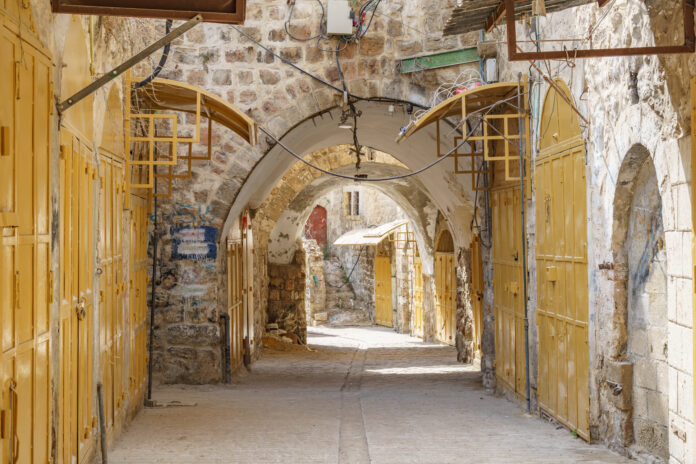Al-Khalil (The Beloved One) is the Arabic name for the city of Chevron. The term refers to Avraham Avinu, Hashem’s beloved and the founder of the Jewish People, who was father to both Yitzchak and Yishmael. Chevron is also the city where a certain Palestinian family has its roots, and numbering among its many children are brother and sister, Daniel and Leah Sinai, who today live in a small apartment in Netanya. Not long ago, they both left their pasts behind and joined the Jewish people.
As they tell their story, their eyes are alternately full of fear and alight with joy. The Daniel of today looks like a typical ben Torah, and Leah’s appearance is like that of any Bais Yaakov graduate. Both speak fluent Hebrew. It’s hard to believe that these two young Jews grew up in a Muslim family that was once involved in terrorist activities against Jews.
The Edwa family is an established Palestinian clan in Chevron. The head of the clan, Yasser Edwa, was born into a family in Jerusalem. Yasser was a passionate convert to Palestinian nationalism and joined the Fatah terrorist movement in his youth, participating fully in its terrorist activities. He was considered extremely close to PLO head Yasser Arafat and over time became a senior member of Fatah. In the 1970s, after one too many arrests and being found guilty of involvement in terrorist activities, Yasser Edwa was expelled to Jordan by the Israeli government, along with several other Fatah members. He settled in Amman, the capital, and worked as a realtor while continuing to be active in the PLO.
Yasser married a woman from Tarqumiya, a town near Chevron, and after having several daughters, they finally had a son. Ultimately, the family’s children numbered 18. Saddam (who would later change his name to Daniel) was one of the oldest.
“I was born in 1990, around the time of the First Gulf War, when Iraqi dictator Saddam Hussein declared war on Israel and attacked the country with Scud missiles that landed in main population centers,” Daniel shares. “Saddam was seen as a hero by the Palestinian people, and they danced on the roofs of their homes each time a missile landed in the heart of Israel. My father decided to name me after him.”
Repelled by Violence
Saddam Edwa grew up in Amman and was educated there, nourished on hatred of Israel. In 1993, the Oslo Accords were signed between Israel and the PLO, and the Palestinian Authority was established soon afterward. Yasser Arafat was granted control over vast tracts of Israeli land, including Chevron. Young Saddam’s father, Yasser Edwa, decided to move there. He settled in a large, four-story home, and Saddam continued his education there in local Arab schools. Like any other Arab child growing up in Chevron, he learned to hate Israelis, especially soldiers and the Jewish settlers who lived nearby.
“They taught us that all Jews were our enemies,” Daniel says. “We were told that Jews had to be shot and killed, that they had stolen our land, and that they were the cruelest, most evil people in the world. We had it drummed into us that it was wonderful to go out and throw stones at cars driven by settlers and to toss firebombs at soldiers, and of course, to kill Jews. If you got killed while doing so, then you were a shahid, a martyr. I had friends who got into fights with Israeli soldiers and some of them did die as shahids, just as we were taught in school. Most of our family belonged to Fatah, but I had some relatives who joined Hamas, which has a very strong presence in and around Chevron.”
From a young age, Saddam had doubts about everything he was taught about Jews. “I was repelled by the violence and felt alienated from the society I was living in,” he says. “Violence is ubiquitous in Arab society. There’s no respect for human life. It’s a cruel society, and that always disturbed me.” One of the things that most bothered him was the way his father treated his mother—harshly, violently. Eventually, she decided that she would take it no longer. She divorced her husband, left her children, and returned to her family in Tarqumiya.
“Because of what happened with my mother, I had many doubts about the Islamic faith,” Daniel says. “I didn’t understand how it could encourage such violent and harsh behavior.”
When Saddam grew up, he decided to distance himself from the violent surroundings of his childhood. In 2008, he traveled abroad to study in the city of Yiwu, in the Jinhua region of China, where he learned Chinese and pursued management studies in the local university. He then found work in international commerce.
A short while later, Saddam traveled to South Africa as a tourist. “I got to know a South African person in China who invited me to visit him in South Africa,” Daniel says. “I thought I’d go for a month, but I ended up falling in love with the place and decided to stay there. I found work with a security firm and did really well for myself. I also met a woman and we got married. Although I was Muslim and she was Christian, it didn’t bother either of us. We had a huge house with a pool, good jobs, and we lacked for nothing.”
Life flowed peacefully in calm Johannesburg, and all the while, Saddam maintained warm ties with his relatives in Chevron.
Then things started to go awry.





















